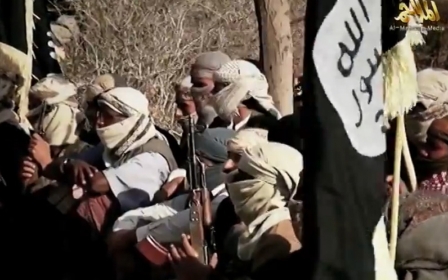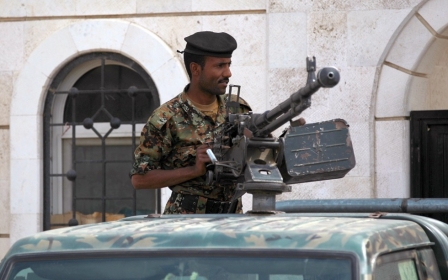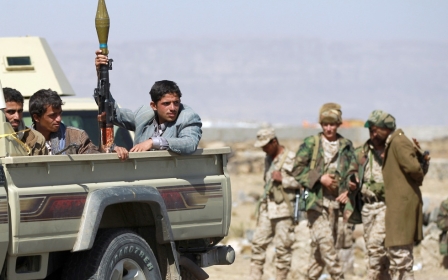Five civilians killed in 'al-Qaeda' battles as Yemen marks Unity Day

A shell smashed into a vehicle killing five civilians on Thursday during clashes between Yemen's army and al-Qaeda suspects in the country's restive south, witnesses said. The killings come as the country marked its controversial Unity Day, although they are not throught to related to the event.
The shelling occurred near Al-Saeed, an al-Qaeda stronghold in Shabwa province, destroying the vehicle and killing all five people on board, the same sources added.
They identified the victims as members of the powerful Shabwa-based Awaliq tribe, from which US-born al-Qaeda cleric Anwar al-Awlaqi, killed in a US air strike in September 2011, hails.
One witness said the "echo of the sound made by the shelling came from an army position", as another spoke of a "mistake" by troops.
A tribal source also said, "The army is responsible for firing at the car".
Stay informed with MEE's newsletters
Sign up to get the latest alerts, insights and analysis, starting with Turkey Unpacked
But a military official denied the accusations, and blamed al-Qaeda.
"Al-Qaeda elements wanted to attack an army vehicle but their shells hit a civilian car," he told AFP.
"Al-Qaeda and its allies are blaming the armed forces in order to impede the offensive" launched by the army on 29 April against jihadist strongholds in Shabwa and neighbouring Abyan.
The Yemeni al-Qaeda in the Arabian Peninsula, took advantage of a 2011 uprising that forced veteran president Ali Abdullah Saleh from power to seize large swathes of the south and east.
The army recaptured several major towns in 2012 but has struggled to reassert control in rural areas despite recruiting militia allies among the local tribes.
The central government is also facing down opposition from southern succesionsinsts and northern Huthi rebels.
On Thursday, as part of the national day celebrations, the Yemeni president appealed to southern leaders to join talks on the country's political future. Separatist sentiment has surges after UN-backed talks that concluded in January failed to address to concerns.
In a speech marking the 24th anniversary of the formerly independent south’s union with the north, President Abdrabuh Mansur Hadi told southern leaders they could still be part of a political settlement.
"We call on those who did not participate in the national dialogue to join the comprehensive national process that excludes no one. The door is still open," Hadi said.
His speech came just a day after thousands took to the streets of the main southern city of Aden demanding renewed independence on the 20th anniversary of the proclamation of a short-lived breakaway state that was crushed by northern troops.
Southern self-rule activists boycotted the national dialogue that concluded with a plan to divide Yemen into six federal regions, four of them in the north.
Even the moderate wing of the Southern Movement (Hirak), which is open to autonomy instead of independence for the south, rejected the plan.
Wednesday's protesters brandished photographs of exiled former South Yemen president who champions secession, Ali Salem al Baid.
Political sources said that Hadi, who is himself of southern origin, was reaching out to exiled leaders, including another former president Ali Nasser Mohammed, and former prime minister Haidar al-Attas.
A southern activist said both men were considering returning to Yemen soon to enter talks.
Middle East Eye delivers independent and unrivalled coverage and analysis of the Middle East, North Africa and beyond. To learn more about republishing this content and the associated fees, please fill out this form. More about MEE can be found here.





